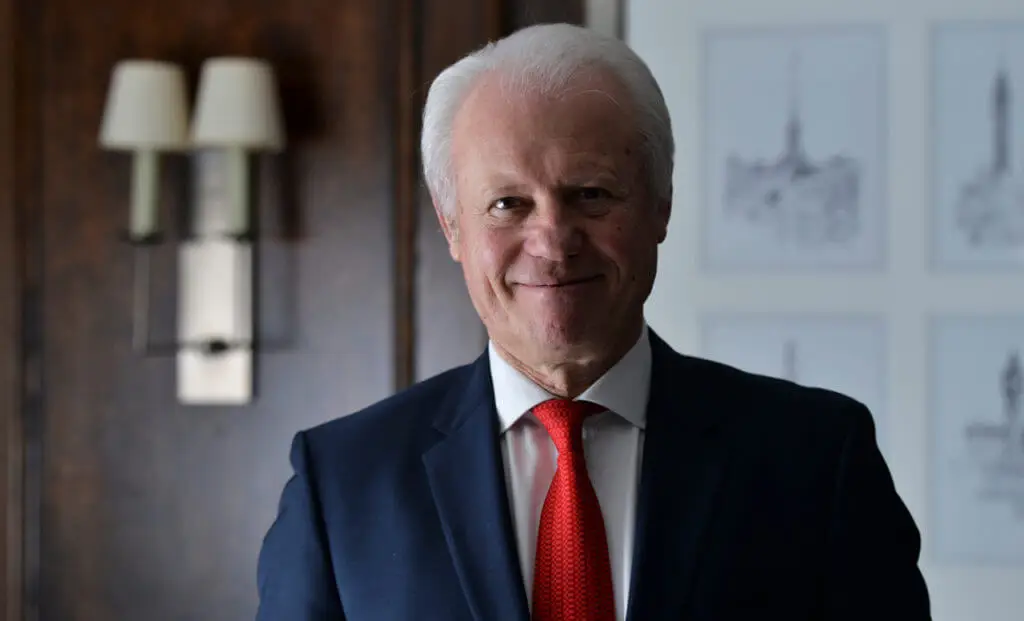Having spent almost 40 years at Le Gavroche, one of the UK’s most established restaurants, and winner of numerous awards, its safe to say that Silvano Giraldin is one of the industry’s most decorated front-of-house icons.
During his time in the hospitality, Silvano has served stars and dignitaries from across the world, listing Charlie Chaplin, Charlton Heston and Henry Kissinger to name a few.
We caught up with the Gold Service Scholarship Trustee, and one of the most recognisable faces in the industry, to get an insight into how he sees the profession and what future front-of-house stars need to consider to develop their skills and careers.
What was it that made you realise that a career in hospitality was for you?
I was very fortunate to have some wonderful tutors who really inspired me to do well. I think mentors are really important when you are starting you career. It’s important to find people who have seen what the industry has to offer and they can guide you along the way. One of my tutors had worked for the likes of Juan Peron (former president of Argentina) and he really inspired me to do well and aim for the very top of my profession. It was through such mentoring that I saw what was possible for me in hospitality.
You worked in some amazing places in Italy, Belgium and Paris before moving to London to join Le Gavroche as a commis de rang at the age of 23. What did these experiences teach you?
I knew that in order to better myself and my career, it was important for me to see different service styles at a young age. I always encourage people to explore and learn as much as they can early on in their careers.
Places like Le Gavroche are incredibly as part of the learning process and some refer to it as a ‘breeding ground’ for top waiters. If you think about it, we’ve had the likes of Fred (Sirieix); Diego (Masciaga) at The Waterside Inn; Jean Claude Breton at Restaurant Gordon Ramsey; and Michel Lang at Alain Ducasse à l’Hôtel de Paris in Monte Carlo.
It’s great to see so many of the people who we’ve trained pop up at some of the best restaurants in the world. These people all came through the rigorous training programmes.
I often see people trying to race to the top and become a restaurant manager in their early twenties and I think, for some, it could mean they miss out on some other experiences early on. It’s really important to be patient, broaden your horizons and work with different people, in different environments before you take that step to becoming a manager somewhere.
Sometimes people are driven by status, sometimes its money. I think we should be driven by a thirst for learning. But clearly people want to earn a good salary to develop their lives. Do you think it should be a driver early on? I always believe that you should want to work in the best place rather than the place that pays you the most. The money will come in time but, early on, it’s really important to work in a place where you will learn the most. This will give you a foundation to be successful.
When I first started, I remember having friends in the same line of work who took jobs which paid them more. Sometimes, I used to feel slightly envious but I knew deep down that I was taking the most sustainable route. I became one of the youngest maitre d’s at Le Gavroche at the age of 26 and I firmly believe it because I learned so much from the different place I worked at before this.
What have your experiences taught you about yourself and your profession?
I’ve always bought into the idea that you should do a job that you like because, that way, you will be good at it. Over the years, I came to realise how much I liked being with people. Good front of house people are often born with this trait, it’s not something you can teach. It’s this that helps you have eyes in the back of your head and gives you the ability to anticipate what customers want before they even have to ask.
I learned very quickly that you can win a customer over in the first five minutes of service. If you receive them well very quickly, you will have a good chance of forming a good relationship with them. Get in wrong in the first five minutes and it’s harder to win them over. You can apply this principle to any walk of life and any business relationship.
What else would you say is important to succeed in front-of-house roles?
I think it’s important to remember that we should be merchants of happiness. People come to restaurants to have a couple of hours of happiness. We need to facilitate that. This doesn’t just apply to individuals. The whole team plays a part. I always see the brigade as an orchestra. If it doesn’t operate as one, there will be chaos. The Maitre D is similar to a conductor; they need to communicate constantly with all parties involved to ensure that they play like a symphony.
It’s not always easy and you need good intuition; to know when to talk. Judgement is very important. Also, surrounding yourself with the right people is crucial. I was fortunate to have some very supportive and talented people around me such as the Roux brothers. I have learned so much from them. I’ve also been very lucky to have an understanding wife who has been so supportive over the years.
Having experienced so much change in London over the years, would you say service and front-of-house has changed a lot too?
I don’t believe that the essence of service has changed or ever will. Of course, London, the scenery, the
environment, the food offer, and the design will change dramatically over time, but people are still people and the principles are the same.
There have been changes in terms of the practical skills some front of house people have, such as preparing some of the food in front of customers such as carving, however what we lose in those terms are gained in terms of allowing the relationship to be less formal and more interactive verbally. Also, it’s important to note that restaurants are more accessible these days, whether it’s through sheer volume or price but these enables service teams to be less formal.
When I arrived in London 40 years ago, there were three or four top establishments, now we have at least 40 or 50. There used to be ‘elite’ who attended restaurants years ago, but this has changed. The style has changed, the customer may have changed, but the principles of pampering customers hasn’t changed.
As one of the Trustees and founding members of the Gold Service Scholarship, why do you think such initiatives are important?
It really important to recognise the role our service teams play as part of the whole experience. The Gold Service Scholarship gives real value to our profession and helps to give those competing the opportunity to further their careers in ways I could only dream of when I was first starting out.
We wanted to show people that there are so many doors which can be opened for service staff and, by providing them with access to some of the best individuals and businesses, they are able to see the depths of the industry and where it can take them. There are so many people behind the scholarship and what it stands for that, not only does the scholarship help to develop practical skills, but it gives competitors the opportunity to meet some of the industry’s most successful stories.
What would you say to anybody looking to enter the hospitality industry?
I think about and beyond everything, it’s really important to enjoy it. Those who don’t enjoy the interaction will find it hard to succeed. This industry can open so many doors for you and turn dreams into reality. Take a look at Willy Bauer; he is a great success story for hospitality as a whole. He started out as a waiter and worked his way up to being a director at some of the most well-known hotels in the world. Outside of this, it’s actually an incredibly fun industry to work in. If people had told me I’d get to meet the likes of Charlie Chaplin and royalty when I first started out, I wouldn’t believe them.
I think our industry and profession has come a long way. The presence of Her Majesty The Queen at the awards ceremony last year just highlighted that for us.
There will be many people thinking about applying for the Gold Service Scholarship, what would you say to them about why they should enter?
Whenever you compete, you learn. Even if you just apply, you are already testing your knowledge. If you compete in the heats, I’m sure you will learn a huge amount and just the process will teach you so much.
Even though the scholarship is relatively new, we have already seen the impact it has had on the careers of so many talented people. To those who are not sure about applying, I’d urge them to do so as it can only benefit their careers.



